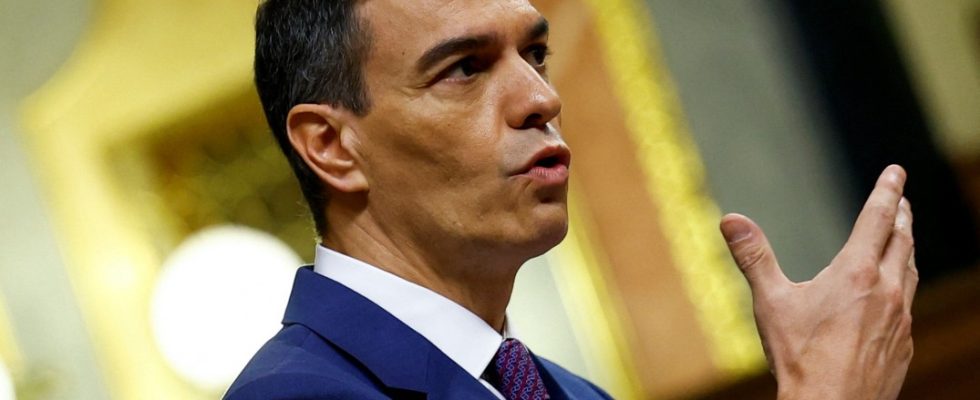The Spanish Parliament has elected the socialist Pedro Sánchez, who has been in power since 2018, as Prime Minister for four more years. 179 of the 350 deputies voted for Sánchez, an absolute majority of Congress. In the national elections in July, Sánchez’s PSOE party was only the second strongest party with 121 seats. In recent weeks, however, the socialist has been able to secure the support of six smaller parties.
The vote was preceded by a day and a half of debate that was at times aggressive and polemical, during which Sánchez’s political opponents particularly accused him of the pact with Catalonia’s two separatist parties. In order to secure their parliamentary votes, Sánchez negotiated an amnesty law for the perpetrators of the illegal secession attempt in October 2017 with, among others, Catalan ex-president Carles Puigdemont, who fled to Belgium. Sánchez had always ruled out such an agreement before the election.
“What is happening in this chamber today was not chosen at the ballot box,” said Alberto Núñez Feijóo, leader of the conservative Partido Popular and leader of the largest parliamentary group. He spoke of “fraud” and “political corruption.” The socialist Sánchez “bought” his election. He now has to expect bitter opposition, not only in parliament but also on the streets.
Every bond between the two major popular parties has been severed
Feijóo left little doubt that all ties between the two traditional popular parties have currently been severed. Reform projects that require a cross-party initiative are likely to suffer as a result in the future, for example a reform of the highest supervisory body of the judiciary, which is politically appointed and has a reputation for not acting independently.
Pedro Sánchez began the parliamentary debate on Wednesday with a speech lasting more than 100 minutes, in which he first took a comprehensive stock of his time in office and made various promises for the future. He only addressed the controversial topic of amnesty in the last third of his speech. “Things are what they are,” he said, adding that one must now make a virtue out of necessity. With a few rhetorical tricks, Sánchez presented the pact with the separatists as a peacemaking measure. At the same time, he committed himself to the unity of Spain.
But the Spanish head of government’s oratory could not hide the fault lines that could arise in the future not only between left and right, but also within his circle of supporters. Visibly tense, Míriam Nogueras, parliamentary speaker for Puigdemont’s Junts per Catalunya party, stepped up to the microphone on Wednesday evening. She demanded that Pedro Sánchez make a stronger commitment to the pact negotiated in Belgium, which also calls for further progress in the relationship with Catalonia. He missed this in his speech on Wednesday morning, which made her “uncomfortable”.
“Don’t push your luck with us,” she said. “Your speech was not courageous.” For a moment it seemed as if Sánchez’s support alliance was falling to pieces in front of the assembled parliament. On Thursday morning, Nogueras spread confirmation in the Spanish press that Junts would vote for Sánchez despite the reservations. The future government will have to earn the support “bit by bit”.
The head of the Vox party repeatedly accused Sánchez of a “coup” in an angry speech
The left-wing Basque party EH Bildu is also not giving Sánchez a “blank check,” said its parliamentary speaker Mertxe Aizpurua as the debate continued on Thursday. And when Aitor Esteban from the conservative Basque party PNV appeared, another discord echoed through the parliamentary chamber: While Aizpurua accused Israel of “genocide”, Esteban called for more support for the country.
Sánchez affirmed Israel’s right to self-defense but called for a ceasefire and recognition of a Palestinian state. As expected, the socialist received the greatest affection from his most important coalition partner, the left-wing alliance Sumar, which will take on the previous role of the Unidas Podemos party over the next four years and get some ministerial posts. Its leader Yolanda Díaz, who was already Minister of Labor in the last legislative period, called for, among other things, a reduction in working hours with the same pay and a higher minimum wage. Sánchez used the debate to announce free public transport for the elderly, young people and the unemployed, as well as the expansion of social psychological services throughout the country.
Meanwhile, MPs from the Vox party demonstrated how radicalized the right-wing extremist movement, founded in 2015, has become. In an angry speech, their leader Santiago Abascal repeatedly accused Sánchez of a “coup d’etat” – words that were later deleted from the minutes on the instructions of the President of Parliament. The 33 Vox MPs left the parliamentary chamber as a unit and stayed away from the debate on Thursday morning. Abascal was spotted on Wednesday evening at the protests that have been taking place for two weeks in front of the PSOE party headquarters, where fascist struggle songs are sung and flags with Francisco Franco’s coat of arms are waved.
Vox leader Abascal even sought confrontation with the conservative Partido Popular: If Feijóo did not fight against the amnesty law with all means possible, Abascal threatened to break the coalitions that exist between Vox and PP at the regional level. Although Feijóo is an opponent of the law, he does not deny its democratic legitimacy.
One of the few humorous moments of the day came from an interjection from the President of the Madrid region, PP politician Isabel Díaz Ayuso. Angered by a swipe Sánchez had thrown at her, the stands muttered something that many understood as “What a son of a bitch” (“qué hijo de puta”). She later wanted this to be interpreted in a different way: she said “me gusta la fruta”, it was later said (“I like the fruit”), which sounds similar, but is rather meaningless.

